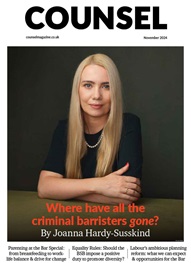*/
Only a quarter of the population believe the UK’s legal system is ‘fair and transparent’, according to a survey published by a London law firm.
More than 50% felt the system was inaccessible and two thirds believed that wealth was the most important factor in gaining access to justice.
The poll of more than 2,000 people carried out for Hodge Jones & Allen also revealed that only 37% trusted professionals working in the legal system.
On a more positive note, just over 70% said better education in legal matters would improve access to justice and a similar percentage felt that legal matters should be taught in primary and secondary schools.
Patrick Allen, senior partner at Hodge Jones & Allen, said: ‘These statistics represent a damning indictment of the British justice system.
‘If millions of people across the country are intimidated, alienated and confused by the prospect of seeking justice in 21st-century Britain then we should consider our legal system to have failed in its fundamental duty to provide justice for all.’
Meanwhile, separate research from Citizens Advice showed that 70% of the population would be unable to afford a lawyer if they needed help with a legal problem.
The survey of more than 2,000 people found that almost 70% said they would feel uncomfortable talking to a lawyer and only about half thought they would be treated with dignity and respect if they had to go to court.
Around a third thought they would not get the opportunity for their voice to be heard in court and under 40% believed the justice system was working well.
Only a quarter of the population believe the UK’s legal system is ‘fair and transparent’, according to a survey published by a London law firm.
More than 50% felt the system was inaccessible and two thirds believed that wealth was the most important factor in gaining access to justice.
The poll of more than 2,000 people carried out for Hodge Jones & Allen also revealed that only 37% trusted professionals working in the legal system.
On a more positive note, just over 70% said better education in legal matters would improve access to justice and a similar percentage felt that legal matters should be taught in primary and secondary schools.
Patrick Allen, senior partner at Hodge Jones & Allen, said: ‘These statistics represent a damning indictment of the British justice system.
‘If millions of people across the country are intimidated, alienated and confused by the prospect of seeking justice in 21st-century Britain then we should consider our legal system to have failed in its fundamental duty to provide justice for all.’
Meanwhile, separate research from Citizens Advice showed that 70% of the population would be unable to afford a lawyer if they needed help with a legal problem.
The survey of more than 2,000 people found that almost 70% said they would feel uncomfortable talking to a lawyer and only about half thought they would be treated with dignity and respect if they had to go to court.
Around a third thought they would not get the opportunity for their voice to be heard in court and under 40% believed the justice system was working well.


The beginning of the legal year offers the opportunity for a renewed commitment to justice and the rule of law both at home and abroad
By Louise Crush of Westgate Wealth Management sets out the key steps to your dream property
A centre of excellence for youth justice, the Youth Justice Legal Centre provides specialist training, an advice line and a membership programme
By Kem Kemal of Henry Dannell
By Ashley Friday of AlphaBiolabs
Providing bespoke mortgage and protection solutions for barristers
Joanna Hardy-Susskind speaks to those walking away from the criminal Bar
From a traumatic formative education to exceptional criminal silk – Laurie-Anne Power KC talks about her path to the Bar, pursuit of equality and speaking out against discrimination (not just during Black History Month)
Yasmin Ilhan explains the Law Commission’s proposals for a quicker, easier and more effective contempt of court regime
Irresponsible use of AI can lead to serious and embarrassing consequences. Sam Thomas briefs barristers on the five key risks and how to avoid them
James Onalaja concludes his two-part opinion series